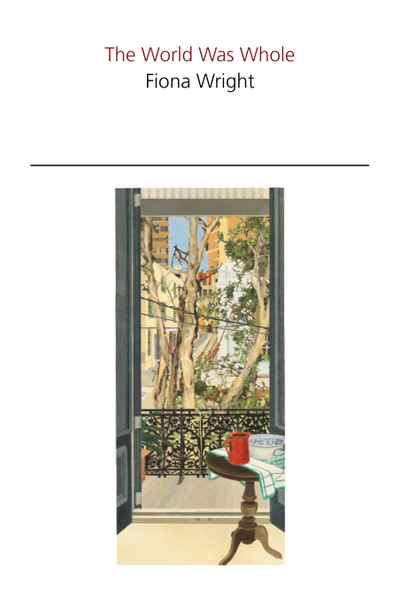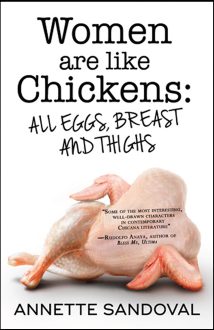 The title emphasizes the orthogonal relationship between the ever-presence of a loved one in presence and in absence. Almost as if love itself is a kind of eu-trauma. A poetics that attempts to grasp the complexity of loving as, with, and through trauma.
The title emphasizes the orthogonal relationship between the ever-presence of a loved one in presence and in absence. Almost as if love itself is a kind of eu-trauma. A poetics that attempts to grasp the complexity of loving as, with, and through trauma.
A review of The World Was Whole by Fiona Wright
 There is so much about the human condition that is illuminated here in these beautifully written pieces. Wright takes the painful, the personal and the often unbearable frailty of life, and expands it so that the work becomes a celebration of being alive, of human resilience and of the beauty of the everyday.
There is so much about the human condition that is illuminated here in these beautifully written pieces. Wright takes the painful, the personal and the often unbearable frailty of life, and expands it so that the work becomes a celebration of being alive, of human resilience and of the beauty of the everyday.
A review of Women are Like Chickens by Annette Sandoval
 The yarn Sandoval spins of their lives, instead, would make an HBO show-runner proud. Death, love, and food are never too far from each other; episodes of powerful yearning, comical justice, and occasional violence replace each other at a cinematic pace.
The yarn Sandoval spins of their lives, instead, would make an HBO show-runner proud. Death, love, and food are never too far from each other; episodes of powerful yearning, comical justice, and occasional violence replace each other at a cinematic pace.
An interview with Margaret Pearce
 The author of the Dungeons and Dragons inspired Mission Perilous talks about her latest book, her upbringing, her writing journey and process, her work in progress, her biggest challenges, her favourite author and lots more.
The author of the Dungeons and Dragons inspired Mission Perilous talks about her latest book, her upbringing, her writing journey and process, her work in progress, her biggest challenges, her favourite author and lots more.
A review of Reykjavík by Tom Maremaa
 What Reykjavík does get absolutely right is the Russian regime’s century-long predilection for poisoning its critics, dissidents and traitors. Arkadi Vaksberg’s meticulous history The Poison Laboratory: From Lenin to Putin (Gallimard) details the state’s expertise at home and abroad in silencing its enemies, all the way from Lenin’s order in 1921 to create a poison laboratory.
What Reykjavík does get absolutely right is the Russian regime’s century-long predilection for poisoning its critics, dissidents and traitors. Arkadi Vaksberg’s meticulous history The Poison Laboratory: From Lenin to Putin (Gallimard) details the state’s expertise at home and abroad in silencing its enemies, all the way from Lenin’s order in 1921 to create a poison laboratory.
A review of The Stendhal Summer by Laurie Levy
 The Stendhal Summer takes the risk of being uncomprehended, yet pays us the compliment of presuming we have lived a little. Thus, mentions of Jean-Louis Barrault, Yves Montand, and Louis Malle’s My Dinner with André (1981), to name just a few examples, either mean something to us or they do not. When they do, they conjure a world of meaning, or an image captured in time, or the tone of a conversation. Such resonances are strange and powerful.
The Stendhal Summer takes the risk of being uncomprehended, yet pays us the compliment of presuming we have lived a little. Thus, mentions of Jean-Louis Barrault, Yves Montand, and Louis Malle’s My Dinner with André (1981), to name just a few examples, either mean something to us or they do not. When they do, they conjure a world of meaning, or an image captured in time, or the tone of a conversation. Such resonances are strange and powerful.
A review of Jeff Herman’s Guide to Book Publishers, Editors & Literary Agents
 Jeff Herman’s iconic Guide to Book Publishers, Editors and Literary Agents is a well-respected industry standard, much like Writers Market. Now in its 28th Edition, the Guide enjoys continued acclaim and popularity—and there is a good reason for this. Flatly stated, it’s just the one of the best, if not the best, of many (many!) writers’ guides out there.
Jeff Herman’s iconic Guide to Book Publishers, Editors and Literary Agents is a well-respected industry standard, much like Writers Market. Now in its 28th Edition, the Guide enjoys continued acclaim and popularity—and there is a good reason for this. Flatly stated, it’s just the one of the best, if not the best, of many (many!) writers’ guides out there.
A Review of Little Reunions by Eileen Chang
 Chang’s cool precise descriptions, reminiscent of her great American contemporary Jane Bowles, are spiked by preternatural attentiveness to light and colour, as in an early scene when Julie walks in the campus grounds where, ‘The sun had baked the red flowers in the blue ceramic flower pots, and had transformed them into little black fists, and had bleached the sea to a faded blue, like old blue linen drenched in sweat.‘
Chang’s cool precise descriptions, reminiscent of her great American contemporary Jane Bowles, are spiked by preternatural attentiveness to light and colour, as in an early scene when Julie walks in the campus grounds where, ‘The sun had baked the red flowers in the blue ceramic flower pots, and had transformed them into little black fists, and had bleached the sea to a faded blue, like old blue linen drenched in sweat.‘
A review of With Walt Whitman Himself in the Nineteenth Century by Jean Huets
 Huets has done an immense amount of research to show America’s bard in his own time. Photographs, nineteenth century American landscape paintings, handwritten excerpts from Whitman’s notebooks, quotations from his poetry and from his contemporaries’ writing make the book reader-friendly.
Huets has done an immense amount of research to show America’s bard in his own time. Photographs, nineteenth century American landscape paintings, handwritten excerpts from Whitman’s notebooks, quotations from his poetry and from his contemporaries’ writing make the book reader-friendly.
An interview with Richard Holleman
 Editor of Voice of Eve talks about his site, its features predictions for the future of the site, why an artist would want to submit, his favorite poets, and more.
Editor of Voice of Eve talks about his site, its features predictions for the future of the site, why an artist would want to submit, his favorite poets, and more.